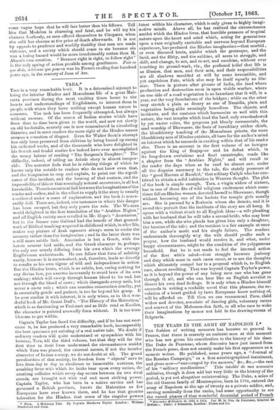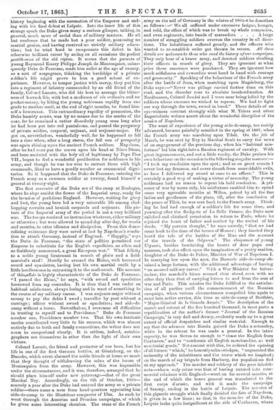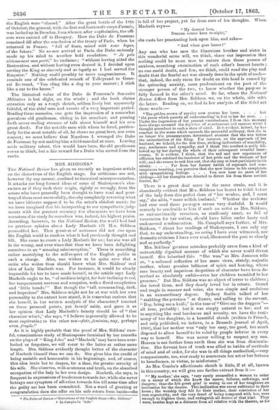TEN YEARS IN THE ARMY OF NAPOLEON I.*
THE fashion of writing memoirs has become so general in France, that there is scarcely an eminent man at this moment who has not given his contribution to the history of his time. The Duke de Fezonsac, whose Souvenirs have just issued from the French press, does not exactly make his first appearance as a memoir writer. He published, some years ago, a "Journal of the Russian Campaign," as a first autobiographical instalment, and gives now—"encouraged by the success," &e., &c.,—the rest
of his "military recollections." This totalite de mss souvenirs militaires, though it does add but very little to the history of the period, is yet not altogether uninteresting. The Duke, a. scion of the old Gascou family of Montesquieu, born in 1784, entered the army of Napoleon at the age of twenty as a private soldier, and, serving nominally from the ranks, had some opportunity to see the varied phases of that wonderful decennial period of French • Sourenirs Alliitaires de 1804 a 1814. Par M. le Duo de Fezenaao, General de Diristoo. Paris: J Dumaine; London: Dubin and Co. history beginning with the coronation of the Emperor and end- ing with his final defeat at Leipsic. Into the inner life of this strange epoch the Duke gives many a curious glimpse, talking, in general, much more of social than of military matters. He all but confesses that be made but a poor soldier, possessing no martial genius, and having received no strictly military educa- tion; but he tried hard to compensate this defect in his otherwise brilliant career by acting on all occasions the perfect gentilhomme of the old regime. It seems that the parents of young Raymond Emery Philippe Joseph de Montesquieu, subse- quently Duke de Fezensac, made him enlist at the age of twenty, as a sort of scapegrace, thinking the hardships of a private soldier's life might prove to him a good school of ex- perience. However, to temper justice with mercy, they put him into a regiment of infantry commanded by an old friend of the family, Colonel Lacuee, who did his best to assuage the bitter- ness of b trrack lite, with but a modicum of vie ordinaire and no pocket-money, by lifting the young nobleman rapidly from one grade to another until, at the end of eight months, he found him- self a lieutenant. This extraordinary rapidity of promotion, the Duke humbly avows, was by no means due to the merits of the .ease, for he remained a rather disorderly young man long after he had been put into red pantaloons, and passed the purgatory of private soldier, corporal, serjeant, and serjeant-major. He got on, nevertheless, wonderfully well, for he happened to fall into a time when, after a long storm, the full sun of prosperity was again shining upon the ancient French noblesse. Napoleon, after he had once put the crown upon his head at Notre Dame, and been anointed with the holy oil of legitimacy by Pope Pius VII., began to feel a wonderful predilection for noblemen in his army, and though be was too wise to entrust them with high commands, liked to have a goodly number as ornamental digni- taries. So it happened that the Duke de Fezensac, entering the French army as a common soldier at twenty, found himself a general at twenty-eight.
The first souvenirs of the Duke are of the camp at Boulogne, where he slept amidst the flower of the Imperial army, ready for the invasion of perfidious England. However, waiting for glory and loot, the young hero led a very miserable life among clod- hopping recruits and brutish corporals and serjeants. His pic- ture of the Imperial army of the period is not a very brilliant one. The troops received no instruction whatever, either military or otherwise ; but were allowed to spend day after day, for weeks and months, in utter idleness and dissipation. From this demo- ralizing existence they were saved at last by Napoleon's resolu- tion to attack Germany, instead of England. " Happily," says the Duke de Fezensac, "the state of politics permitted our Emperor to substitute for the English expedition, so often and so fruitlessly announced, a great European war." What felicity to a noble young lieutenant in search of gloire and a field- marshal's staff! Merrily he crossed the Rhine, with borrowed sword and epaulettes, having lost his own martial outfit by a little heedlessness in entrusting it to the mail-coach. His account of thisAffair is highly characteristic of the Duke de Fezensac. "I passed the Rhine," he says, "with sword and epaulettes borrowed from my comrades. It is thus that I was under an habitual misfortune, always losing and in want of something in the course of my military career. I was serjeant-major without money to pay the debts I owed ; traveller by post without a carriage ; officer without sword or epaulettes; and aide-de- camp without a horse. Nevertheless, I overcame all difficulties in trusting to myself and to Providence." Duke de Fezensac number one, Providence number two. That his own intrinsic merits contributed very little to his success, which was almost entirely due to birth and family connections, the writer does not seem to comprehend clearly. It is seldom, indeed, autobio- graphers see themselves in other than the light of their own virtues.
Colonel Lacuee, the friend and protector of our hero, lost his life in one of the first German battles, at Giintzburg, on the Danube, which event alarmed the noble friends at home so much that they thought of withdrawing the scion of the house of Montesquieu from the army. However, this was impossible under the circumstances, and it was, therefore, arranged that he should place himself under new patronage—that of the great Marshal Ney. Accordingly, on the 6th of October, 1805— scarcely a year after the Duke had entered the army as a private soldier—there came a note from head-quarters appointing him aide-de-camp to the illustrious conqueror of Ulm. As such he went through the Austrian and Prussian campaigns, of which he gives some interesting sketches. The state of the French
army on the soil of Germany in the winter of 1805-6 lie describes as follows: —" We all suffered under excessive fatigue, hunger, and cold, the effect of which was to break up whole companies, and even regiments, into bands of marauders. . . . A large number of straggling soldiers overran the country in all direc- tions. The inhabitants suffered greatly, and the officers who wanted to re-establish order got threats in return. All these details are unknown to those who read the history ofour campaigns. They only hear of a brave army, and devoted soldiers rivalling their officers in search of glory. They are ignorant at what price these successes were purchased. They are ignorant how much selfishness and cowardice went hand in hand with courage and generosity." Speaking of the behaviour of the French army after the battle of Jena, when marching upon Magdeburg, the Duke says:—" Never was pillage carried further than on this road, and the disorder rose to absolute insubordination. At Nordhausen, Colonel Jomini and I were near being killed by the soldiers whose excesses we wished to repress. We had to fight our way through the town, sword in hand." These details of an eye-witness contrast strongly with what M. Thiers and other Imperialistic writers assert about the wonderful discipline of the armies of Napoleon.
The want of experience of the young aide-de-camp, too rashly advanced, became painfully manifest in the spring of 1807, when the French army was marching upon Tilsit. On the .5th of March, he was sent by Ney to Marshal Suult to carry the news of an engagement of the previous day, when his "habitual mis- fortune" led him right into a Russian regiment of cavalry. With great ingenuousness, and not a little vanity, the Duke praises his own behaviour on the occasion in the following singular manner:— " I took my resolution upon the spot ; and as on groat events I never lost my firmness, and never shrank from unavoidable evils, so here I delivered my sword at once to an officer." This is certainly a good way of making a virtue of necessity. The young nobleman had no reason to repent his bold resolution. A pri- soner of war by name only, his misfortune enabled him to spend some very agreeable months at Willie, petted by all the fine ladies and gentlemen of the place, till, after the conclusion of the peace of Tilsit, he was sent back to the French army. Think- ing he had had enough of a soldier's life for some time, and yearning after the fleshpots of La Belle France, the Duke now solicited and obtained permission to return to Paris, where he rejoiced the heart of father and mother by the recital of his deeds. "My parents thought," he says naively, " that we bad come back to the time of the heroes of Homer ; they fancied they heard the tale of the battles of the Bias and the account of the travels of the Odyssea." The eloquence of young Ulysses, besides bewitching the hearts of dear papa and mamma, took also effect upon the imagination of a pretty maiden, daughter of the Duke de Feltre, Minister of War of Napoleon L In marrying her upon the spot, the Homeric aide-de-camp ob- tained a large fortune, with the additional advantage of having "an assured military career." With a War Minister for father- in-law, the marshal's baton seemed clear ahead, even with no other duty than that of carrying letters to and from the seat of war and Paris. This mission the Duke fulfilled to the satisfac- tion of all parties until the commencement of the Russian campaign, when various circumstances compelled him again to euter into active service, this time as aide;de-camp of Berthier, "Major-General de la Grande Armee." The description of the march and retreat of the five hundred thousand, in most parts a republication of the author's former " Journal of the Russian Campaign," is very dull and dreary, evidently made up to a groat extent of official despatches and similar material. Enough to say that the advance into Russia gained the Duke a colonelcy, while in the retreat he was made a general. In the latter capacity, be was fortun to enough to " chase the English from Cuxhaven," and to "confiscate all English merchandize, as well as colonial goods." Not content with this, lie ordered the opening of all letters; "which," he honestly acknowledges, "augmented the animosity of the inhabitants and the terror which we inspired; on the march of my brigade from Harburg, the populations fled at my approach." The murder and robbery of the poor inhabit- ants—whose only crime was that of having entered into com- mercial relations with England—went on for-several mouths, at the end of which the brave general was transferred to the first corps d'armea, and with it made the campaign of Saxony, ending in the battle of Leipsic. The account of this gigantic struggle which finally decided the fate of Napoleon, is given in a few lines ; so that, in the memoirs of the Duke, Leipsic looks quite insignificant at the side of Cuxhaven, where the English were " chased." After the great battle of the 18th of October, the general, with the first and fourteenth corps d'armee, was locked up in Dresden, from whence, after capitulation, the offi- cers were carried off to Hungary. Here the Duke de Fezensac remained till after the conclusion of the treaty of Paris, when he returned to France, " full of fears, mixed with same hopes, of the future." No sosner arrived at Paris, the Duke seriously made up his mind to another bold resolution. " Je pris serieusement mon parti," he exclaims ; " without having aided the Restoration, and without having even desired it, I decided upon serving the King as sincerely and as loyally as I had served the Emperor." Nothing could possibly be more magnanimous. It reminds one of the celebrated remark of Talleyrand to Gene- ral Bertrand, " You cling like a dog to your master ; I stick like a cat to the house."
The historical value of the Duke de Fezeusac's Souvenirs Militaires is but slight, on the whole ; and the book claims attention only as a rough sketch, seldom lively but apparently faithful, of the chief men and events of a very important period. Reading these memoirs, one gets the impression of a somewhat garrulous old gentleman, sitting in his armchair, and pouring forth never-ending streams of talk about himself and his own great deeds. For the notable men with whom he lived, particu- larly forthe most notable of all, he shows no great love, nor even respect.; we must believe that Napoleon I. wronged the Duke de Fezensac by not making him a field-marshal at once. Leaving aside military talent, this would have been, the old gentleman seems to think, but a fair reward for a Duke who served from the ranks.
































 Previous page
Previous page